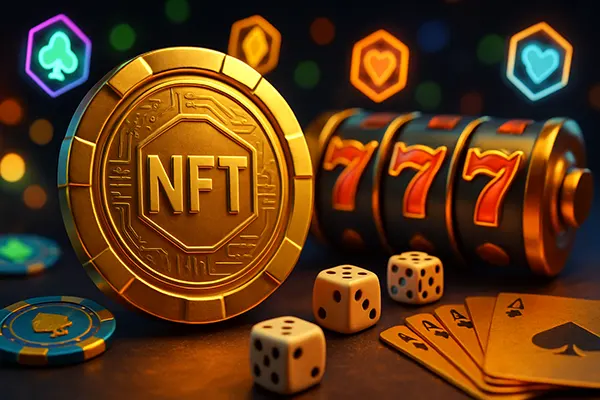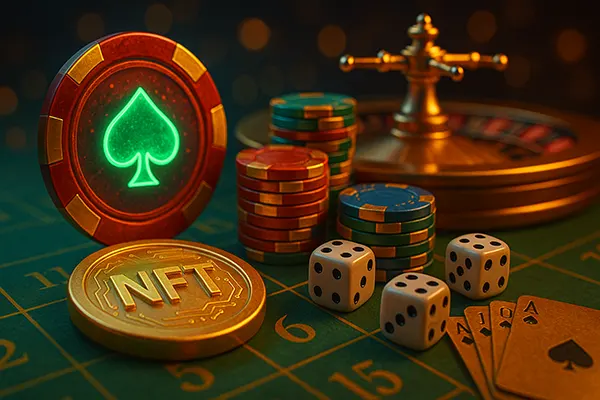
NFT in Online Casinos: A New Era of Gaming Rewards and Collectibles
Non-fungible tokens (NFTs) are steadily making their way into the online casino industry, changing the way players interact with games, bonuses, and loyalty systems. As digital ownership becomes more central to user engagement, several casinos have already begun experimenting with NFT-based systems to attract and retain players. This innovation combines blockchain transparency with gamification, creating a unique and verifiable way to reward players and distinguish loyal users.
NFTs and Loyalty Programmes: A Digital Evolution
The traditional approach to loyalty in online casinos typically involves point systems, cashback, or free spins. However, NFTs offer a much more personalised and potentially valuable reward. These digital assets can represent exclusive achievements, in-game items, or access to special tournaments, and they are owned by the player—not just locked within the casino’s system. The unique, immutable nature of NFTs ensures that each reward is genuinely individual and cannot be counterfeited.
Some platforms now allow players to trade their NFT rewards on secondary marketplaces or use them across multiple games, creating a bridge between gambling and true digital asset ownership. This interoperability is especially appealing to younger, tech-savvy audiences who already engage with NFTs through gaming or art platforms like OpenSea or Rarible.
One standout example is the ICE Poker project by Decentral Games, where players receive NFT wearables that grant access to virtual poker tournaments. These NFT items not only signal status but also provide gameplay utility and can be bought, sold, or rented by others.
Real Integration in Active Casino Ecosystems
By February 2025, platforms such as Rollbit and Stake.com have introduced their own NFT series that offer tiered access to exclusive benefits. Rollbit, for instance, has integrated NFTs that provide holders with cashback multipliers, priority support, and unique avatars displayed in chatrooms. These tokens are limited in quantity and tradable, making them both collectible and functional.
Additionally, metaverse casinos like Sand Vegas and others within Decentraland or The Sandbox use NFTs to define land ownership, game rights, and even revenue shares from in-game casinos. This model attracts a blend of crypto investors and gambling enthusiasts who view NFT-based rights as long-term digital assets with growing value.
Operators benefit from increased engagement and retention, as users with NFTs are more likely to return, trade, and invest time in their virtual personas. The loyalty experience becomes more immersive and financially rewarding, far beyond what traditional bonuses can offer.
Legal Considerations and Regulatory Uncertainty
Despite their potential, NFTs in gambling raise complex legal questions. As of February 2025, most jurisdictions have yet to fully classify NFTs under gambling, financial, or consumer protection laws. This grey area poses both risks and opportunities for early adopters. While blockchain transparency can enhance trust, the speculative nature of NFT values could attract regulatory scrutiny.
Regulators in the UK and EU have begun consultations to address the status of NFTs in relation to online gambling. The UK Gambling Commission, for example, issued a statement in late 2024 noting that any use of NFTs that has monetary value or confers gambling privileges must comply with existing licensing standards. However, enforcement and classification vary widely across regions.
One of the biggest challenges is KYC (Know Your Customer) and AML (Anti-Money Laundering) compliance. Since NFTs can be transferred peer-to-peer, tracking ownership and ensuring lawful use requires new tools and partnerships between casinos and blockchain analytics firms like Chainalysis or Elliptic.
The Role of Compliance Technology
To address these legal uncertainties, several blockchain casinos have implemented advanced monitoring tools that track wallet activity and NFT provenance. This not only ensures regulatory alignment but also enhances the reputation of platforms embracing compliance-first approaches. Smart contracts can now be written with embedded restrictions that disable NFT transfers until identity verification is completed.
For instance, the casino project Mooning Monkey requires full KYC before players can mint or trade their NFT-based avatars, linking each asset to a verified account. This creates a balance between decentralisation and compliance, something regulators are closely observing.
While full regulation is still a work in progress, projects that proactively adopt these technologies are more likely to maintain long-term operations without facing legal shutdowns or sanctions from financial authorities.

What the Future Holds: Mainstream Adoption or Niche Utility?
The trajectory of NFTs in online casinos strongly depends on user adoption, technical development, and regulatory clarity. If these digital assets continue to evolve in function and value, they may soon become a cornerstone of online gaming. Their potential to personalise and decentralise rewards systems resonates with a generation that prioritises ownership and uniqueness in digital experiences.
Another promising direction is the integration of NFTs with decentralised autonomous organisations (DAOs). In this model, NFT holders could vote on future game features, reward structures, or even revenue distribution, creating a co-ownership model that was previously unimaginable in traditional online gambling.
However, scepticism remains. Many users are wary of the volatility associated with NFTs, especially when connected to financial rewards. Market crashes, scams, and lack of understanding continue to hinder mass adoption. For casinos, educating users and maintaining transparency will be essential to building long-term trust in NFT systems.
Steps Towards Sustainable Integration
To move from experimental use to widespread acceptance, casinos must prioritise user value over hype. This involves creating NFTs with real utility—such as unlocking game levels, access to VIP zones, or earning passive rewards—rather than speculative price-based collectibles.
Partnerships with reputable blockchain developers, clear terms of use, and robust customer education portals will also be key. As users become more familiar with the technology, barriers to entry will shrink, making NFT integration more feasible for mid-size and large-scale operators.
Ultimately, the casinos that treat NFTs not as a gimmick but as a long-term player engagement tool will define the next evolution of online gambling experiences.
